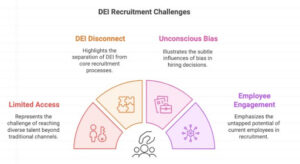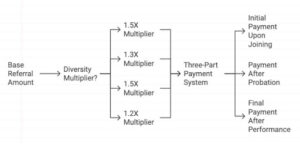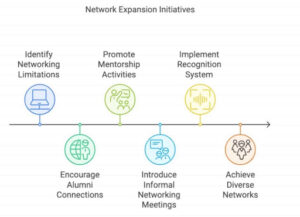Organizations often invest heavily in diversity hiring initiatives and sophisticated talent acquisition tools, but many overlook a powerful catalyst for change that already exists within their ecosystem — employee referrals.
The conventional wisdom suggests that referral programs might work against diversity objectives. After all, people tend to network within similar demographic groups. But that’s not entirely true.
For enterprises serious about moving beyond surface-level diversity metrics, it’s time to examine how a well-structured employee referral program can actually broaden your talent pool rather than narrow it. The key lies in understanding how to evolve your referral program from a simple hiring channel into a strategic tool for building truly diverse teams.
Understanding current challenges in DEI recruitment
Limited access to diverse talent pools
Traditional recruitment channels often create echo chambers, connecting us repeatedly to the same talent networks. Campus recruitment focuses on tier-1 cities, job boards attract primarily active candidates, and recruitment agencies tend to tap into their existing databases. This approach inadvertently excludes qualified candidates from different geographical locations, educational backgrounds, and professional paths.
The DEI-recruitment disconnect
Many organizations treat DEI as a separate initiative rather than an integral part of their recruitment DNA. Despite well-intentioned policies, diversity considerations often remain an afterthought in the hiring process, leading to fragmented efforts and inconsistent outcomes. When DEI becomes a checkbox exercise rather than a strategic imperative, it loses its transformative potential.
The stubborn reality of unconscious bias
Even with robust screening processes and standardized interviews, unconscious bias continues to influence hiring decisions. These biases manifest in subtle ways – from how job descriptions are written to how candidate cultural fit is assessed. The challenge extends beyond individual biases to systemic patterns that can inadvertently favor certain candidate profiles.

Employee engagement: The missing link
Current employees, who could be powerful advocates for diverse hiring, often remain passive participants in the recruitment process. Their networks, experiences, and insights – particularly those of employees from underrepresented groups – remain largely untapped. This represents a missed opportunity to authentically expand our talent reach.
While personal networks have always been valuable in Indian business culture, today’s competitive talent market demands a more systematic approach. Companies with structured referral programs see better retention rates compared to other hiring sources.
3 Ways to fuel diversity and equity With referrals
Structured incentives for diversity referrals
An effective diversity referral program must move beyond generic bonuses to create meaningful, systemic change. Let me break down a practical approach based on market realities in India.
For example, if your organization’s base referral amount is ₹40,000, you might implement diversity multipliers like:
- 1.5X for women in tech roles where representation is below 25%
- 1.3X for candidates from Tier 2/3 cities
- 1.5X for differently-abled professionals
- 1.2X for first-generation tech professionals

The key is structuring payouts strategically. Consider a three-part payment system: an initial amount upon joining, another portion after successful completion of probation, and a final installment after a defined period of strong performance. This approach helps focus on both hiring and retention.
While attractive incentives matter, they work best when part of a broader inclusion strategy. Focus on creating an environment where diverse talent wants to stay and thrive, using referral incentives as one tool in your larger DEI toolkit.
Network expansion training and support
Think about how most of us build our professional networks in India. We typically connect with people from our college, previous companies, or through friends in similar circles. This often means our networks become quite similar – perhaps mostly people from top-tier colleges, major metro cities, or similar backgrounds.
To change this, companies need to help their employees build broader, more inclusive networks. Here’s how this can work in practice:

Start with something as simple as alumni connections.
Encourage your employees to become mentors or guest speakers at colleges in tier-2 or tier-3 cities. A senior developer from your Bengaluru office could conduct monthly online sessions for engineering students in places like Indore, Nagpur, or Coimbatore. This gives your employees connections in new communities.
Make networking activities part of the regular work culture.
Consider starting “Network Expansion Chai Meetings” where teams can casually discuss their networking efforts. These meetings shouldn’t feel like formal training but rather like informal discussions where people share their experiences of connecting with different communities. An employee might share how they joined a Women in Tech group and the interesting perspectives they gained, encouraging others to step out of their usual networks.
To encourage participation, create a straightforward recognition system.
When employees connect with professional groups from different cities or mentor students from diverse backgrounds, acknowledge their efforts. This could be as simple as highlighting their stories in team meetings or giving them opportunities to lead similar initiatives.
The goal is to help your employees slowly build a network that includes people from different educational backgrounds, cities, and communities. This naturally leads to more diverse referrals over time.
ERG (Employee Resource Groups )-Powered Referral Campaigns
Think of your company’s Employee Resource Groups not just as community spaces but as powerful engines for diverse hiring. ERGs naturally understand the challenges and opportunities for different communities, making them ideal partners in your referral program.
Let’s say your company has a Women’s ERG. Instead of asking them to simply share job postings, empower them to create targeted referral campaigns. The ERG members can design specific outreach strategies that resonate with women in technology. They might know, for instance, that many talented women technologists prefer companies with clear growth paths and flexible work arrangements. This insight helps shape how job opportunities are presented.
Make these ERG referral campaigns special events rather than ongoing programs. For example, run a month-long “Women in Tech” referral drive where ERG members get extra support and resources. Give them access to premium LinkedIn accounts during this period, budget for hosting small networking events, or time to attend women-focused tech meetups. When the campaign is time-bound, it creates urgency and excitement.
Include ERG leaders in redesigning the referral process itself. They might suggest changes like highlighting specific aspects of your company culture that appeal to diverse candidates or creating special referral landing pages that showcase employee stories from their communities. For instance, your LGBTQ+ ERG might recommend showcasing your organization’s same-sex partner benefits or trans-inclusive healthcare policies when reaching out to their networks.
This approach works because it’s authentic – ERG members are naturally connected to diverse communities and understand what makes your company attractive to different groups. They’re not just referring candidates; they’re building bridges between your company and their communities.
Transform your referral program with RippleHire
Building a diverse and equitable workplace through employee referrals requires more than just good intentions – it needs the right technology backbone to make it happen. This is where RippleHire steps in as your strategic partner in creating an inclusive referral program that delivers results.
With features like customizable referral workflows, automated reward systems, and detailed analytics, you can turn your diversity goals into measurable outcomes.
What sets RippleHire apart is our deep understanding of the Indian market and enterprise needs. Our platform helps you tap into extended employee networks, track referral sources, and measure the impact on your diversity metrics. Our solution adapts to your unique needs while maintaining the simplicity your employees expect.
Let’s have a conversation about how RippleHire can help you build a more diverse and inclusive workplace. Book a demo with us and our experts will show you how our platform can transform your referral program from a basic hiring channel into a powerful driver of workplace diversity.






